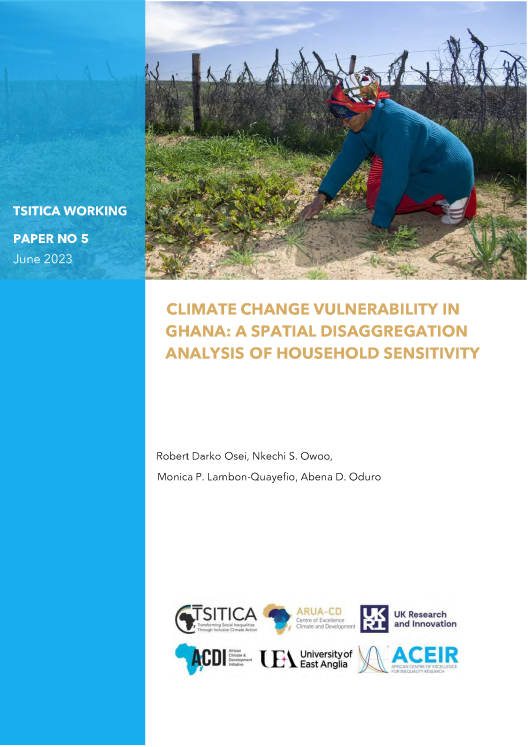Climate change vulnerability in Ghana: A spatial and disaggregation analysis of household sensitivity
Robert D. Osei, Nkechi. S. Owoo, Monica P. Lambon-Quayefio, Abena D. Oduro
TSITICA Project Working Paper no. 5, June 2023.
Published by ARUA Centre of Excellence in Climate Change and Development & African Centre of Excellence for Inequality Research.

Climate change adaptation strategies are becoming an important priority in many developing countries, and it is important to assess the degree to which individuals within a country are susceptible to the effects of climate change. Using the 2009, 2014 and 2019 waves of the Ghana Socioeconomic Panel Survey (GSEPS) and two sets of climate change vulnerability indices, patterns of climate change sensitivity across various population groups are presented. Results of the analyses show that climate change vulnerabilities have been declining in Ghana over time. Economic factors and poor living conditions are stronger contributors to households’ climate change sensitivities, while nutrition and demographic characteristics are less prominent factors. Using the 2019 wave of the GSEPS data, it is observed that vulnerabilities remain higher in rural, compared to urban areas; in male-headed, compared to female-headed households; and are more prominent in poorer compared to richer households. Regional analyses also show that, compared to regions in southern Ghana, the three northern regions are particularly vulnerable to climate change, although within-region nuances are noted. Spatial analyses of climate change vulnerability indicate that the intensity of climate change vulnerabilities is lowest in the regional capitals in the country, including those in northern Ghana. This suggests some inequality in the distribution of social amenities such as water and sanitation, among others, between northern and southern Ghana, rural and urban Ghana, and between major regional cities and other communities. Development programmes can play a critical role in reducing the sensitivity to climate change by programmes specific interventions. Read more
TSITICA was a collaborative, multi-country interdisciplinary research project. It brought together two ARUA Centres of Excellence with researchers from the universities of Ghana, Nairobi and Cape Town, and from the UK universities of Bristol, East Anglia and Manchester and the London School of Economics. The support of the African Research Universities Alliance and UK Research and Innovation are gratefully acknowledged. Visit project website.
